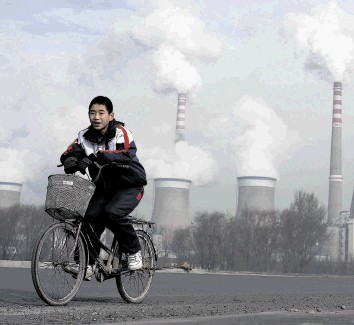
Global temperatures in 2015 are set to reach one degree centigrade above pre-industrial levels for the first time, scientists have warned.
Temperatures around the world have averaged 1.02C above the 1850-1900 period between January and September this year, the Met Office said.
With an “El Nino” climate phenomenon in the Pacific, which pushes up temperatures, developing on top of warming caused by greenhouse gases put into the atmosphere by humans, 2015 as a whole is set to be 1C above pre-industrial levels.
The figures, from a dataset run by the Met Office and the Climatic Research Unit at the University of East Anglia, were released ahead of key United Nations talks in Paris aimed at tackling climate change.
The Paris talks aim to agree an international deal which will put the world on a path to limiting global temperature rises to no more than 2C above pre-industrial levels – a threshold beyond which the worst impacts of climate change are expected to be felt.
Human activities such as the burning of fossil fuels have altered the natural balance and in 2014, globally averaged levels were 143% of pre-industrial levels, according to a new report by the World Meteorological Society.
Dr Peter Stott, head of the climate monitoring and attribution at the Met Office said the latest figures revealing global average temperature rises reaching 1C were another piece of evidence that showed once again the “unequivocal warming” of the Earth.
“There’s been an extra push from El Nino, nevertheless the fact is we have human influence driving our climate into uncharted territory, because we are now above 1C,” he said.
While not every year from now on was necessarily going to be 1C above pre-industrial levels, because of natural variability in the climate, as the Earth warms, more and more years will be past the 1C marker and it will eventually become the norm, he said.
2015 is expected to be a record warm year for the planet, with early indications that 2016 will be similarly hot.
Although today’s figures show the world is half way to the 2C limit, scientists also warned that humans had already put two-thirds of the carbon emissions into the atmosphere that can be emitted and still have a likely chance of curbing temperature rises to 2C.
And the planet has seen 20 centimetres (7.9 inches) of sea level rises since pre-industrial times, caused by the warming of the oceans and melting of ice, but this is only a third of what could be expected by 2100 if temperatures rise by 2C.
While governments have agreed to curb temperature rises to 2C, some countries such as low-lying Pacific Islands who face being swamped by sea level rises, want to see commitments to prevent increases of no more than 1.5C.
But Professor Joanna Haigh, co-director of the Grantham Institute for Climate Change and Environment at Imperial College London, said that even the 2C target was very challenging, though still within reach.
“Given that 2C is very difficult, 1.5C is probably in fantasy land. We will be pleased if we can get to 2C,” she warned.
Analysis of climate commitments made by countries in the run-up to the talks for action they will take up to around 2030 suggests that curbing emissions at those levels will lead to temperature rises of around 3C by the end of the century.
The commitments could reduce the impacts of heatwaves and flooding on millions of people each year, compared to a “business as usual” scenario of rising greenhouse gas emissions which could see temperatures soar to 5.2C above pre-industrial levels by 2100.
But they would have far less success at reducing the number of people threatened by water shortages and drought, or the amount of crops lost in the face of climate change, research shows.
Strong action after 2025 or 2030 to meet the 2C goal would significantly reduce the threats of heatwaves, flooding, water stress and crop declines.
Professor Myles Allen, from the University of Oxford, also warned that greenhouse gas emissions needed to be reduced to zero in the long term to prevent further future temperature rises.
He said negotiators in Paris needed to acknowledge that emissions had to get to net zero to stabilise the climate. “The scientific consensus on that is absolutely solid and it would be great to see the politicians acknowledge that reality,” he said.
Amber Rudd, Secretary of State for the Department of Energy and Climate Change said: “Climate change is one of the most serious threats we face, not just to the environment, but to our economic prosperity, poverty eradication and global security.
“It’s clear we need to take urgent action to tackle global warming and move to a low carbon future, that’s why I want an agreement on a global deal to tackle climate change in Paris this December.
“Pledges to reduce emissions made by countries so far represent a significant commitment but that’s just the beginning.
“We need to ensure that as the costs of clean energy fall, countries can be more ambitious with their climate targets.”
Recommended for you
